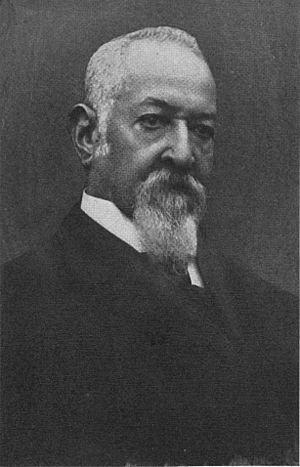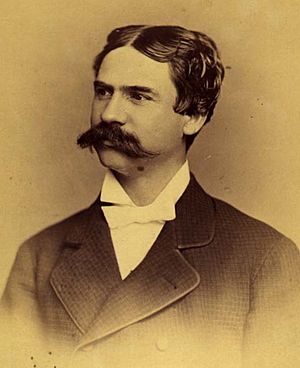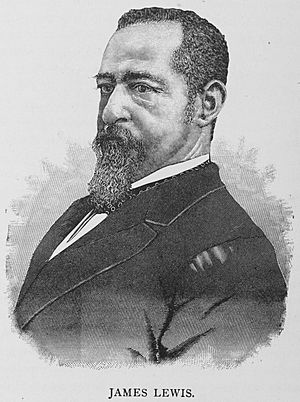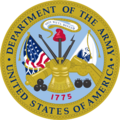James Lewis (Louisiana politician) facts for kids
Quick facts for kids
James Lewis
|
|
|---|---|

Lewis in 1908
|
|
| Born | 1832 |
| Died | July 11, 1914 (aged 81–82) New Orleans, Louisiana
|
| Occupation | Soldier, politician |
| Political party | Republican |
| Military career | |
| Allegiance | United States of America |
| Service/ |
|
| Years of service | 1862–1864 |
| Rank | |
| Unit | First Louisiana Volunteer Native Guards, Company K |
James Lewis (1832 – July 11, 1914) was an African-American soldier and Republican politician from Louisiana. He played an important role in American history during and after the American Civil War.
Born into slavery, James Lewis was of mixed race. During the Civil War, he left his job on a Confederate steamboat. He moved to New Orleans, which was then controlled by Union troops. There, he helped create the First Louisiana Volunteer Native Guards. He became a captain in this group and served until 1864.
After the war, Lewis became very active in the Republican Party. This was during the Reconstruction era, a time when the Southern states were rebuilt. He worked with other important Black leaders in New Orleans and Louisiana. This period was challenging for politics in Louisiana, but Lewis remained a strong leader for many years.
He first worked for the Freedmen's Bureau, an organization that helped formerly enslaved people. He raised money and set up schools for them. Lewis was also appointed as a federal customs inspector. He was the first African American to get a federal government job in Louisiana. Later, he joined the New Orleans Metropolitan Police force. For many years, he held important state and federal government jobs. These jobs were usually with the U.S. Treasury Department. He also served as the surveyor-general (a person who maps land) for Louisiana and Mississippi.
Lewis was also a Freemason and a leader in the Grand Army of the Republic. This was a group for Civil War veterans.
Contents
Early Life and Work
James Lewis was born into slavery in Wilkinson County, Mississippi in 1832. His father was a white plantation owner and his master. His mother was an enslaved woman of mixed race. He grew up in Bayou Sara, Louisiana.
Before the Civil War (1861–1865), Lewis worked on steamboats on the Mississippi River. He worked on the steamboat Ingomar and became friends with Robert Reed Church. He also met Norris Wright Cuney through his steamboat work. All three men later became important political leaders after the Civil War.
Joining the Civil War Effort
At the start of the Civil War, Lewis worked as a steward on the CSS De Soto. He was present at the Battle of Belmont in November 1861. He was also at the Battle of Island Number Ten and New Madrid in early 1862. Lewis believed the war was a chance for all Black people to gain their freedom.
He bravely escaped to New Orleans after David Farragut and Benjamin Butler's Union forces captured it in 1862. He wanted to join the Union army. In New Orleans, Lewis decided he wanted to be a soldier. He and other Black men asked for permission to form a regiment of Black troops. Lewis successfully formed two companies of Black infantry. He became a captain of one of these, Company K, in the First Louisiana Volunteer Native Guards. Most of the soldiers in this group were formerly enslaved people who had escaped to Union lines.
Lewis left his position after the Red River Campaign in 1864. He later explained that he resigned because he was told that no Black officers would be allowed to continue serving. In November 1864, Lewis was allowed to recruit another company of infantry. This company would join the 1st United States Colored Infantry. He agreed to do this if he could become an officer.
In 1864, Lewis married Josephine Joubert, a free woman of color from New Orleans. Her family had owned slaves. For many years, they lived in a nice house on Canal Street.
Reconstruction Era Leadership
After the war, Lewis returned to New Orleans. He worked as a broker until ocean trade reopened and the Reconstruction Era began. He was appointed as a traveling agent for the education department of the Freedmen's Bureau. He worked to set up schools for formerly enslaved people across Louisiana.
During this work, former Confederates often threatened him because they opposed his efforts. Once, he was captured in North Louisiana and was in danger. However, a group of fellow Freemasons helped rescue him. He might have been hurt in the 1866 New Orleans riot. This riot happened when white people attacked a parade of Black people celebrating their right to vote.
When the Freedmen's Bureau closed, Republican Governor William P. Kellogg appointed Lewis as a United States customs inspector for Louisiana. This made him the first Black man to hold a federal government job in Louisiana. In 1869, Lewis lost this job for political reasons. He then became a sergeant in the Metropolitan Police in New Orleans. He did well and was promoted to captain. In 1870, Governor Henry Clay Warmouth appointed Lewis as a colonel in the State Militia. That year, Lewis was also elected to a two-year term as an administrator of police.
Some Black Republicans in Louisiana began to oppose Governor Warmouth. This group was called the Custom House Ring. It included federal appointees like Lewis, Stephen B. Packard, and James F. Casey. Casey was President Ulysses S. Grant's brother-in-law. The Custom House Ring supported George W. Carter for governor. Carter and Warmouth had serious disagreements in late 1871 and early 1872. Former Confederate General James Longstreet was in charge of the Louisiana state militia. He was called to protect the statehouse from Carter's group. Lewis did not respond to Longstreet's call for the militia.
Serving as a Republican Appointee
In 1872, Lewis was nominated for Congress at the state Republican Party convention. He also led the Louisiana group at the 1872 Republican National Convention in Philadelphia. When he returned to New Orleans, party disagreements were causing problems. Lewis decided not to run for Congress. Instead, he supported P. B. S. Pinchback. He also campaigned for William P. Kellogg for governor. Lewis was then nominated and elected as an administrator of public improvements in New Orleans. His opponents in this election included former Confederate General P. G. T. Beauregard. Lewis was known for being a good public servant and for managing money well.
In the mid-1870s, Lewis was the only Republican appointee in the New Orleans city government. In 1876, he campaigned with Governor Packard. The state legislature then elected him to the United States Senate. However, he did not take his seat. The state government was taken over by Democrats, and Lewis chose not to push his claim.
In 1877, President Rutherford B. Hayes appointed Lewis as the naval officer of the port at New Orleans. He held this job until 1880. At the 1880 Republican National Convention, Lewis was one of the "306" who supported Ulysses S. Grant. This was until the final vote, which was won by James A. Garfield.
Lewis returned to public service on May 1, 1883. He was appointed United States Surveyor-General for the Louisiana District. In January 1884, Secretary of the Treasury Charles J. Folger appointed him as superintendent of the United States bonded warehouse in New Orleans. He continued to hold the surveyor-general position for Louisiana.
He continued to serve as surveyor general during the presidencies of William McKinley, Theodore Roosevelt, and William Howard Taft. This was from 1897 to 1913. During this time, white conservative Democrats controlled Louisiana. The state passed a new constitution that made it very hard for Lewis and most African Americans to vote. However, President Benjamin Harrison appointed Lewis as deputy collector of customs and immigration inspector in the early 1890s.
In 1884, Lewis was a commissioner and Chief of the Accommodation Bureau. This bureau was part of the Colored People's Exhibit at the World Cotton Centennial. This was a World's Fair held in New Orleans.
In October 1890, Lewis was one of fifty people chosen by Mayor Joseph A. Shakspeare. This committee investigated the murder of New Orleans Police Department Chief David Hennessy. Lewis was the only Black person on the committee.
In the 1890s and early 1900s, Lewis and Walter L. Cohen were important political friends in Louisiana of Booker T. Washington. Washington was the president of Tuskegee Institute. He believed in a moderate approach to race issues. Lewis was a member of the National Afro-American Council. This group was started by T. Thomas Fortune and was influenced by Washington. In 1898, Lewis strongly supported including Black troops in the forces sent to the Spanish–American War. Lewis remained involved in politics, even though the Republican Party faced many challenges in the state.
Other Activities and Personal Life
In 1890, Lewis stated that he was a member of a Grand Army of the Republic (GAR) group in 1865 and 1866. He said it broke up during the Mechanics Union riot in 1866. Lewis helped push for Black members to be accepted into the GAR in 1890. He later became the Department Commander of the GAR for Louisiana and Mississippi. Lewis was also an active Freemason.
People described Lewis as having a "massive build and pleasing features." They said his "lordly manners" gave him the charm of an "old school gentleman."
Lewis' son, James Lewis Jr., was an active member of the Black elite in New Orleans. His daughter, Julia (Lewis) Nickerson (born around 1878 – died December 7, 1908), was a talented violinist and cellist. She played in her husband, William J. Nickerson's orchestra.
James Lewis died in New Orleans on July 11, 1914.
Images for kids
 | Delilah Pierce |
 | Gordon Parks |
 | Augusta Savage |
 | Charles Ethan Porter |





